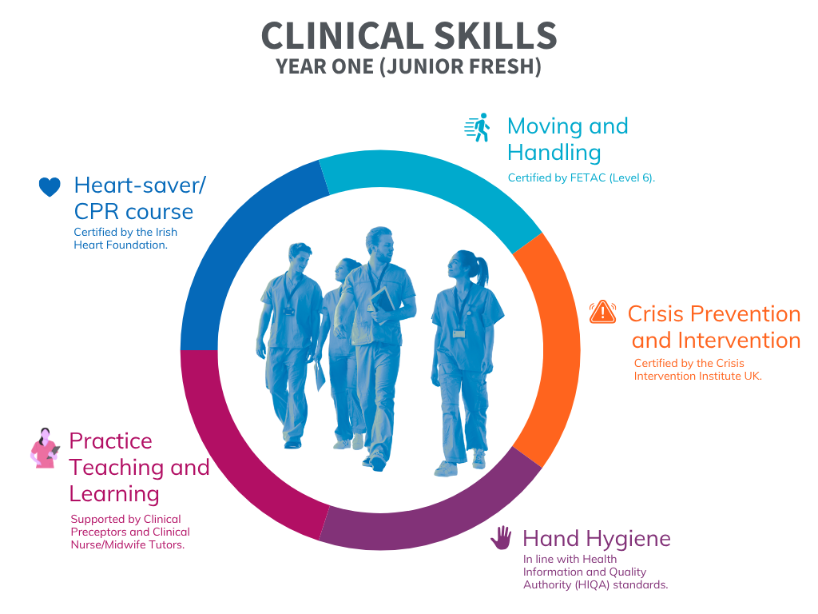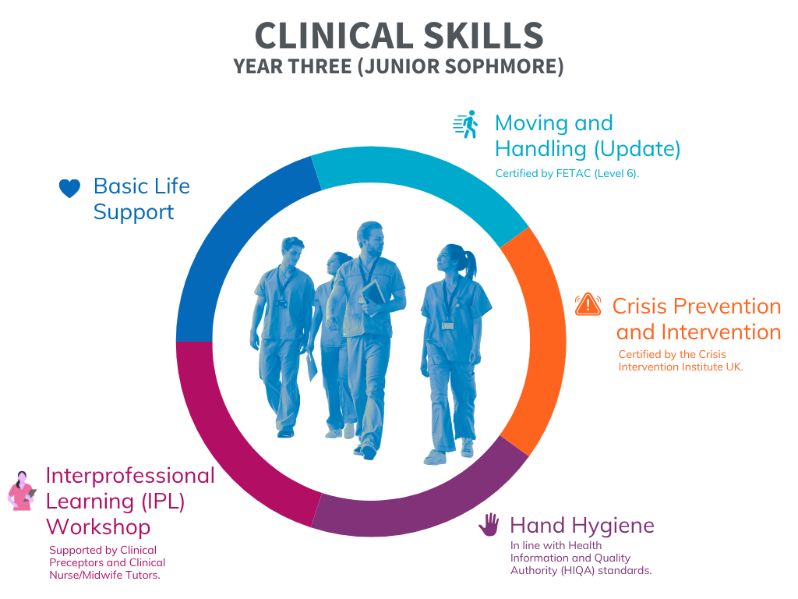Undergraduate Clinical Skills
In Year One all disciplines will have a specific set of mandatory clinical skills to complete before attending practice placements. Mandatory clinical skills are certified. Further details will be given to you as you progress through your programme. The mandatory skills include:
- Heart-saver/CPR course - certified by the Irish Heart Foundation
- Moving and Handling – certified by Fetac (Level 6)
- CPI - certified by Crisis Prevention Institute UK
- Hand Hygiene – in line with HIQA

Other clinical skills classes covered in Year One include and are task-oriented: Universal Precautions and Infection Control, Vital Signs, Urinalysis and Toileting, Skin Care, Personal and Oral Hygiene, Eating, Drinking and Fluid Balance, Blood Glucose Monitoring, Catheterisation and Aseptic technique, Administration of Medications and Injections, Respiratory Therapy and Intravenous Therapy and Communication Techniques employed at the bedside.
In Year One of your programme there will be practice teaching provided to you from a member of the clinical skills team in the practice setting. This is additional support you will receive while on clinical placement.
Skills will vary in relation to the modules you cover in that year (shared and discipline specific).
You will begin to develop physical assessment skills and relate these to specific clinical skills and gain more experience with managing care with a simulated patient.
In Year Three, you will integrate what you have learnt about problem-solving and critical thinking and put it into practice in the clinical skills area. All students will be able to work in a simulated healthcare environment to manage and prioritise patient care and patient safety. This will be facilitated by practising healthcare scenarios involving high-fidelity computerised patients/manikins that mimic particular patient conditions. The student has to assess, plan, implement, and evaluate nursing care with their team of interdisciplinary healthcare workers. This work is assessed in year three modules.
Children & General Integrated programme and General nursing students will also have the opportunity to participate in a module of interdisciplinary learning with five other disciplines from the Faculty of Health Sciences in preparation for the Internship year.
All disciplines have specific clinical skills workshops delivered in the practice facilitated by the clinical skills team. This provides an opportunity for students to practice and revise some of their clinical skills in preparation for their practice placements throughout year three of the programme.
In Year Three, you will have a specific set of Mandatory Skills to complete before your practice placements. Mandatory skills are certified and there is a cost to the certification. Further details will be given to you as you progress through your programme. The mandatory skills include:
- Basic Life Support
- Moving and Handling update
- CPI (Crisis Prevention Intervention)
- Hand Hygiene Techniques
- JS interprofessional learning (IPL) workshop

JS – Shared module which manage ID, IPL care in the services and the community. All students (all dsiciplines) have the opportunity to practice and manage integrated care in a safe environment in the Trinity Simulation Suite (TSS) without xxxxx patients which mirrors the reality of the work environment for healthcare students.

/filters:format(webp)/filters:quality(100)/prod01/channel_3/media/tcd/nursing-midwifery/images/clinical-skills-centre/Undergraduate-Clinical-Skills---Large-Banner.png)